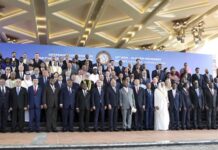Most people associate the countryside with the beauty of nature but when Adel, an asylum-seeker, first glimpsed the countryside near his new village in Bosnia and Herzegovina, he saw a chance to turn fertile land into a thriving business.
It was 2018 and he had just arrived in the village near the northwestern town of Bihac with his son Sajad, 12, after fleeing Iran.
“The countryside around Bihać has good land and I immediately saw a chance for my son and me to build a new life … The good people of the village offered me an opportunity to start my life again and I took that chance,” he said.
He drew on his knowledge as an agronomist back in Iran to plant corn, onions and gherkins, raise poultry and keep bees on the patch of rent-free land the villagers had offered him. His aim now is to establish a thriving business that will provide employment for local people.
However, he cannot realize that dream until he receives a decision on his asylum application.
UNHCR, the UN Refugee Agency, is aware of some 75,000 refugees, asylum-seekers and migrants who have passed through Bosnia and Herzegovina since early 2018. Only a small percentage remain in the country to claim asylum while most try to reach western Europe.
Adel is part of a tiny minority of those who see their future in Bosnia and would like to stay. Overall, the numbers of asylum-seekers and migrants arriving in the country has dropped during the COVID-19 pandemic, but authorities still face challenges providing both humanitarian aid and access to rights for vulnerable groups, including asylum-seekers.
The capacity of the authorities is particularly stretched in the northwest part of the Una-Sana Canton, where Adel’s village is, as well as in Sarajevo, the capital.
Long wait times make it especially stressful for people claiming asylum in the country due to the uncertainty involved. Adel, for example, claimed asylum in 2019 with the assistance of UNHCR.
Nine months later he was granted the right to work. As well as tending to his land, he has put his language and other skills to use as a cultural mediator with the World Church Service in reception centres in Una-Sana Canton while awaiting a decision on his refugee status.
“Now my major concern is waiting for the decision by the authorities. I have plans and resources to improve my family’s life in Bihać, to expand my crops and to be able to sell the produce. To do that, I need to have my status regulated,” he said.
UNHCR’s Assistant High Commissioner for Protection Gillian Triggs met Adel when she visited Bosnia and Herzegovina in July. She congratulated him for his entrepreneurial contribution to the country’s economy and his local community, while still being an asylum seeker.
“It is important to identify those genuinely seeking asylum in Bosnia and Herzegovina as early as possible and register and process their claims,” she said, stressing that she understood the pressure that Adel and others face as they wait, many times for years, for their decision.
“Long waiting times, especially for people with vulnerabilities, may affect their potential for integration. UNHCR will support the authorities to improve the asylum processes,” she said.
UNHCR is working with the Ministry for Human Rights and Refugees as well as civil society and refugees to develop a bylaw for better integration. The law would help asylum-seekers navigate the country’s complex administrative system, improve access to education, vocational and language training, and social services.
In the meantime, however, the route to finding a place in the society can be a long one. Saiffedin Khalid, for example, arrived in the country from the Syrian city of Aleppo on a student visa in 2015 and soon afterwards sought asylum.
It took another two years before he could enroll at the University of Travnik, but he was forced to drop out because he did not have the right to work and earn an income. Eventually, he was granted subsidiary protection status – a form of international protection that usually comes with fewer rights than refugee status – and moved to Sarajevo where he found work as a tour guide at a local travel agency.
In April 2020 he lost that job due to the COVID-19 pandemic. Thanks to an EU-funded project aimed at mitigating the impact of the pandemic on vulnerable refugees in Bosnia and Herzegovina, he received aid packages from UNHCR until COVID restrictions were eased and he was able to get his job back.
Since May, he has been working with UNHCR’s free legal aid partner in the country, Vaša Prava, as a peer-to-peer educator on another EU-funded project that provides information to prospective asylum-seekers. It’s a fresh start and an opportunity to practice his Bosnian language skills, but it’s been a long journey to stability.
“I tell people who wish to seek asylum in Bosnia … (to) be patient and learn the language as it shows respect for the community that is welcoming you,” he said. “It takes time but having a new life in safety is achievable.”
Source: UNHCR





